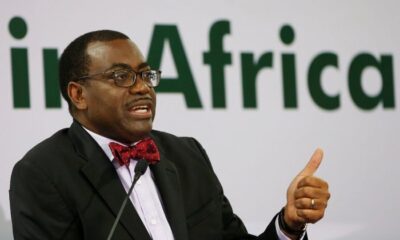Finance
Cost of Funds Ease on Liquidity Injection
Published
8 years agoon

- Cost of Funds Ease on Liquidity Injection
The Nigerian Interbank Offered Rate (NIBOR) dropped 6.5 percentage points to five percent on average last Friday as the money market was awash with cash from budgetary disbursal and coupon payment on matured bonds.
The cost of borrowing among commercial lenders had closed at 11.5 per cent the preceding Friday due to drop in liquidity in the market necessitated by bond and treasury bills sales.
According to Reuters, about N400 billion was injected into the banking system last Wednesday from December budget allocations to states and local governments, while N49 billion coupon on matured bonds was released by the central bank on Friday, boosting liquidity and forcing down interbank rate.
On Thursday, the central bank withdrew around N217 billion through the sales of short-dated open market operations (OMO) bills in a bid to reduce the level of excess liquidity in the banking system, but market liquidity remains high.
Balance in commercial lenders’ accounts with the central bank stood at N254.46 billion surplus on Friday, as against N202.58 billion the preceding week.
“We strongly believe that the central bank will conduct more OMO next week to take out the excess cash from the system,” one trader said, adding that expected dollar sales at a special forex auction could also help reduce the liquidity level and seen rate rising again.
The naira was unchanged at N498 to the dollar on the parallel market and N305.25 per dollar on the official interbank window on Friday as the market awaited the result of a special forex auction targeted at selected sector of the economy.
The central bank had on Wednesday asked commercial lenders to submit backlog dollar demand from fuel importers, airlines, raw-materials producers, and makers of agricultural chemicals and machinery for manufacturers.
The stock market main index rose 0.15 percent to 26,328 points, higher level since January 16, driven by gains in energy company Oando, which was up 4.05 percent and local French Total tick up 4.9 percent.
Monetary Policy Committee
The Monetary Policy Committee (MPC) at the end of its first meeting in 2017 held last week resolved to retain all its monetary policy instruments.
Specifically, the MPC kept the Monetary Policy Rate (MPR) at 14 per cent, the cash reserve requirement (CRR) at 22.5 per cent; also held the liquidity ratio at 30 per cent; and retain the asymmetric corridor at +200 and -500 basis points around the MPR. While reading the MPC communique, Emefiele said the committee was of the view that the key undercurrent that is scarcity of FX, low fiscal activity, high energy prices and the accumulation of salary arrears – cannot be directly ameliorated by monetary policy actions. He said the committee also anticipated that the recent increase in oil prices would be complemented by production gains to provide the needed tailwinds to sustainable economic activity.
In that regard, the committee commended the commitment of the fiscal authorities to step up efforts to fill the aggregate demand gap through a speedy resolution of the domestic indebtedness of the federal government to states and local contractors. The Committee believes that doing so will aid the effort towards economic recovery.
“Total foreign exchange inflows through the CBN increased significantly by 82.45 per cent in December 2016 owing mainly to the increase in oil prices.
Total outflows, however, spiked during the same period. The Committee noted that the average naira exchange rate remained stable at the inter-bank segment of the foreign exchange market in the review period.
Naira Value
The Central Bank of Nigeria (CBN) last week said it was working assiduously with the fiscal authorities to preserve the external reserves as well as to safeguard the value of the naira.
The central bank’s acting Director, Corporate Communications, Isaac Okorafor, said it had observed with great concern the continued and unwarranted attack on its policies by a group of Nigerians, whose real interests, findings had shown was anything near altruistic but rather self-serving and unpatriotic.
The banking sector regulator said while it respects the rights of every Nigerian or stakeholder to their respective views, it found it curious that certain interests had remained persistent in their move to misinform the larger public, with the intention of discrediting genuine efforts at managing the economy, thereby creating panic within the financial system.
It said Intelligence reports at its disposal revealed the involvement of some influential interests funding the push to have the CBN and the federal government reverse its forex policy which is aimed at conserving foreign exchange and also promoting exports.
“As the Bank has explained severally, its decisions on forex management were prompted by the challenge the country’s reserves suffered at the time, arising from issues such as speculative attacks and round tripping.
” It is pertinent to note that pressures on the country’s foreign reserves persisted due to a huge fall in the monthly foreign earnings, which fell from over US $3.2 billion to as low as $400 million at a time when the demand for the US dollar, particularly by importers, continued to rise considerably,” it added.
Inequality and Poverty
The Managing Director of the International Monetary Fund (IMF), Christine Lagarde last week bemoaned the high level of inequality in Africa.
The IMF boss while commenting on her Visit to Uganda, stressed that growth was essential for improving the lives of people in low-income countries. This, she said should benefit all parts of society.
She noted that in sub-Saharan Africa, presently, it is more than twice as expensive to move from rural to urban areas than it is in China. Furthermore, she said only a third of sub-Saharan African households have electricity, compared to 85 per cent in the rest of the world.
“And in low-income countries, only about 20 percent of the adult population has a bank account, compared to more than 80 percent in the rest of the world. Such barriers get in the way of successful and equitable reforms.
Infrastructure development and financial sector reforms are examples.
“More, and more efficient, spending on roads, airports, power grids and education help an economy grow more productive and make it easier for people to relocate from farms to cities.
Fitch on Nigeria’s Outlook
Fitch Ratings last week revised the outlook on Nigeria’s long-term foreign and local currency Issuer Default Ratings (IDRs) to negative from stable and affirmed the country’s IDRs at ‘B+’. The issue ratings on Nigeria’s senior unsecured foreign currency bonds was also been affirmed at ‘B+’. Similarly, the country’s ceiling was affirmed at ‘B+’ and its short-term foreign and local currency IDRs was affirmed at ‘B’. The global rating agency attributed its decision to revise the outlook on Nigeria’s long-term IDRs to the country’s tight foreign exchange (FX) liquidity and low oil production. These according to Fitch contributed to Nigeria’s first recession since 1994. The Nigerian economy contracted through the first three quarters of 2016 and Fitch estimated Gross Domestic Product (GDP) growth of -1.5 per cent in 2016 as a whole.
“We expect a limited economic recovery in 2017, with growth of 1.5 per cent, well below the 2011-15 annual growth average of 4.8 per cent. The non-oil economy will continue to be constrained by tight foreign exchange liquidity. Inflationary pressures are high with year on year consumer price index (CPI) inflation increased to 18.5 per cent in December.
“Access to foreign exchange will remain severely restricted until the Central Bank of Nigeria (CBN) can establish the credibility of the Interbank Foreign Exchange Market (IFEM) and bring down the spread between the official rate and the parallel market rates. The spot rate for the naira has settled at a range of N305-N315 per dollar in the official market, while the Bureau de Change (BDC) rate depreciated to as low as N490 per dollar in November 2016.
Power Sector Firms in 60% FX Allocation
Desirous of revamping the country’s ailing power sector, the MPC last week told commercial banks and other authorised dealers in the foreign exchange (FX) market to include power sector operators in its FX allocation policy which stipulated that 60 per cent of total FX purchases from all sources (interbank inclusive) should be channelled to the manufacturing sector. Therefore, Emefiele, urged operators in the power sector to take advantage of the priority FX allocation given to the sector to enhance their operations.
“The 60 per cent that has been set aside of all FX that is available to all the banks to manufacturers, we did that for a purpose because we felt that there is need to support manufacturing sector. There is need to ensure that FX is made available to those that will provide jobs and get the manufacturing and industrial output to look positive. And I am happy that the recent data released by the Nigerian Bureau of statistics has started to show that the Purchasing Manager’s Index (PMI) is looking upward.
“The 60 per cent that is set aside for the manufacturers, I dare say that those in the power sector also qualify for that because they are importing plants and equipment or components for their transformers and generators for their machines. I don’t mean generators that people will put in their houses and generate electricity for themselves. We will appeal to the banks to look in their directions increasingly,” Emefiele explained.
Is the CEO and Founder of Investors King Limited. He is a seasoned foreign exchange research analyst and a published author on Yahoo Finance, Business Insider, Nasdaq, Entrepreneur.com, Investorplace, and other prominent platforms. With over two decades of experience in global financial markets, Olukoya is well-recognized in the industry.

You may like
-
Nigeria Joins BRICS as Partner Country, Strengthening Global South Cooperation
-
70 Million Poorest of The Poor Nigerians To Get N75,000 From FG
-
Nigeria Surpasses OPEC Quota with 1.51 Million bpd, Targets 2.06 Million in 2025
-
Global Investors Commit $7.6 Billion to Nigeria’s Development at AIF 2024
-
Nigeria-China Trade Strengthened as Grimaldi Introduces Direct Shipping Line
-
Nigeria’s GDP Records 3.46% Growth in Q3 Spurred by Non-Oil Sector













